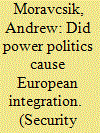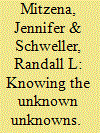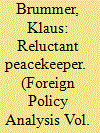| Srl | Item |
| 1 |
ID:
029874


|
|
|
|
|
| Publication |
London, Routledge & Kegan Paul, 1968.
|
| Description |
viii, 118p.Hbk
|
| Series |
Library of Political Studies
|
| Standard Number |
710063024
|
|
|
|
|
|
|
|
|
|
|
|
Copies: C:1/I:0,R:0,Q:0
Circulation
| Accession# | Call# | Current Location | Status | Policy | Location |
| 001923 | 658.403/CHA 001923 | Main | On Shelf | General | |
|
|
|
|
| 2 |
ID:
124792


|
|
|
|
|
| Publication |
2013.
|
| Summary/Abstract |
There is much to admire in Sebastian Rosato's Europe United: Power Politics and the Making of the European Community.1 Its core argument exemplifies ambitious, theory-driven scholarship aimed at establishing a revisionist account of European integration in the 1950s, which it generalizes to a monocausally realist theory of regional integration. "The European Community," Rosato argues, "is best understood as an attempt by . . . France and Germany . . . to balance against the Soviet Union and one another."2 Since many have observed that early European integration was influenced by the geopolitical imperative of balancing against the Soviet Union and its Communist allies, this explanation is not intuitively implausible. With much realist writing having degenerated (in the "philosophy of science" sense) into a neoclassical form often indistinguishable from liberal theory, Rosato remains a real realist. At the same time, at his best, as in his discussion of the defeat of the European Defense Community (EDC), he shows himself to be a nuanced historian who recognizes the complex interaction of ideology and geopolitics in bringing about events. Europe United's explicit aim to predict the future means that it has important implications not just for scholars, but for contemporary decision makers and citizens. All this deserves praise.
|
|
|
|
|
|
|
|
|
|
|
|
|
|
|
|
| 3 |
ID:
089798


|
|
|
|
|
| Publication |
2009.
|
| Summary/Abstract |
This Essay investigates the pragmatic and symbolic aspects of elites' views about European integration. The pragmatic aspect includes general support for unification and attitudes to supranational redistribution.
|
|
|
|
|
|
|
|
|
|
|
|
|
|
|
|
| 4 |
ID:
104074


|
|
|
|
|
| Publication |
2011.
|
| Summary/Abstract |
International Relations (IR) theory grants a privileged place to uncertainty. In practice, however, the problem does not seem to be uncertainty but certainty: if only the decision makers would acknowledge uncertainty, conflict might somehow be avoided. We challenge the "uncertainty bias" of IR scholarship by developing misplaced certainty as a distinct and common pathway to war. By misplaced certainty we mean cases where decision makers are confident that they know each other's capabilities, intentions, or both; but their confidence is unwarranted yet persists even in the face of disconfirming evidence. We argue that misplaced certainty drives two familiar conflict pathways thought to depend on uncertainty: security dilemmas and spirals. We then conceptualize misplaced certainty, highlighting its affective dimension. Building on the work of post-Keynesian economists and economic sociologists we articulate the dynamics of certainty production and how it can go awry. Our "confidence model" of certainty can account for both the phenomenology and frequency of misplaced certainty, particularly in conflict situations, while providing social theoretical underpinnings to the Classical Realist admonition of prudence.
|
|
|
|
|
|
|
|
|
|
|
|
|
|
|
|
| 5 |
ID:
114129


|
|
|
|
|
| Publication |
2012.
|
| Summary/Abstract |
Religious beliefs can affect preferences of decision makers who formulate and guide foreign policy. This article investigates the relationship between preferences affected by Islamic worldview of Turkey's new leadership and foreign policy the new elite conduct through two simple models. The models are games against nature; thus, Turkey is the only decision maker facing no strategic uncertainty. It is found that the subjective estimates of achieving gains under the new foreign policy (NWP) and the old foreign policy (SQP) are critical and distinct from gains and costs of both policies. The new Turkish foreign policy (NWP) is a reversible move, even though Turkish decision makers evaluate it as generating a higher gain and a lower cost compared with the preservation of the status quo (SQP). The implementation of the NWP does not only depend on its gain but also on how attractive is the SQP.
|
|
|
|
|
|
|
|
|
|
|
|
|
|
|
|
| 6 |
ID:
119670


|
|
|
|
|
| Publication |
2013.
|
| Summary/Abstract |
This article addresses the ambiguity of the governmental politics model (GPM) concerning the selection of policy options by political actors. It argues that the GPM's core proposition in this respect ("Where you stand depends on where you sit") can be conceptualized by integrating its substantive claims into the two-stage process of the poliheuristic theory of decision making (PH). This is accomplished through the introduction of a "noncompensatory organizational loss aversion variable" in the first stage of PH, according to which decision makers reject all options that are unacceptable for their organization irrespective of their benefits in other decision-making dimensions. In the second stage, the decision makers scrutinize the remaining options more thoroughly with respect to several decision dimensions, including organizational interests. This article uses Germany's decision to participate in EUFOR RD Congo, a military operation of the European Union in the Democratic Republic of Congo (DRC), to probe the plausibility of the revised GPM.
|
|
|
|
|
|
|
|
|
|
|
|
|
|
|
|